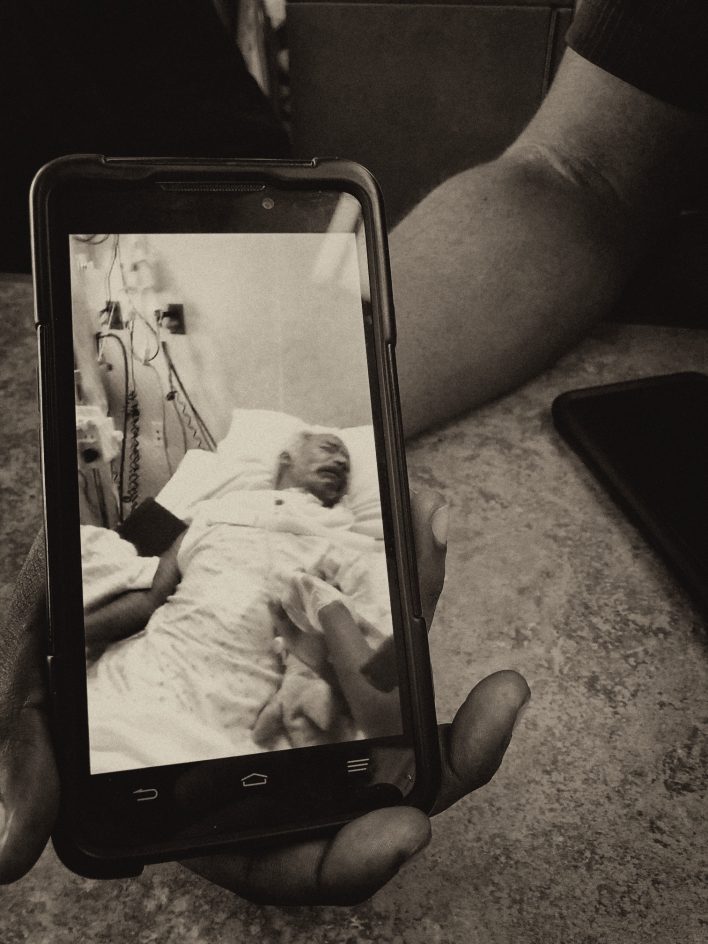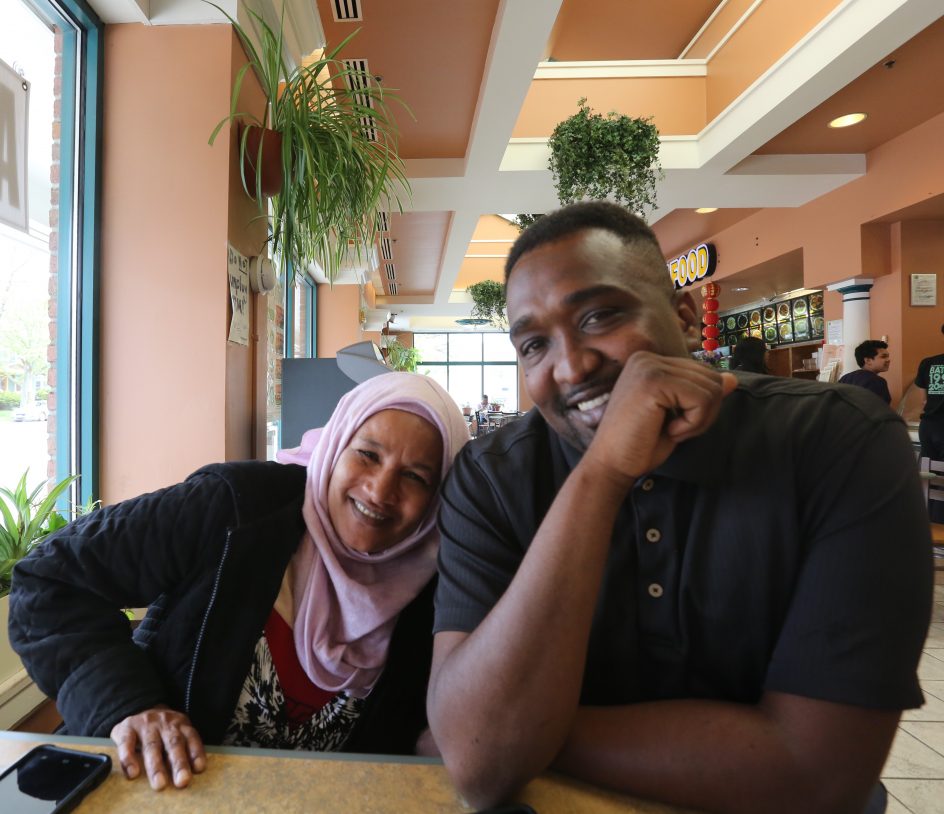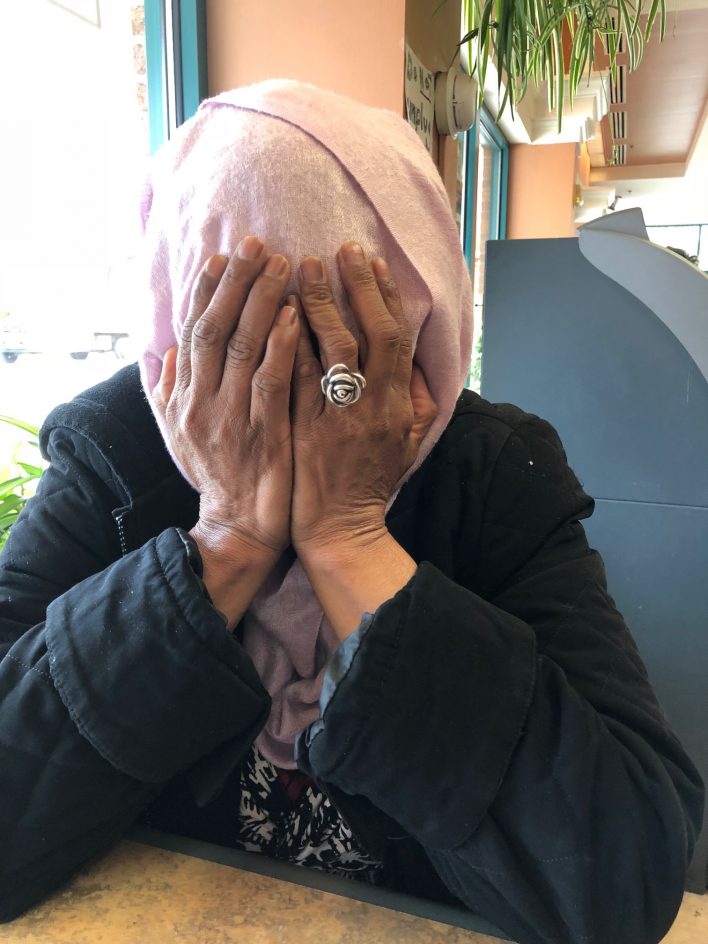Hawah Altoum, Dunkin’ Donuts, Madison Avenue, Albany
Like most of the Muslim refugee women, Hawah Altoum was terrified of having her photo taken. I often encounter this, although it is hard for some of my readers to understand.
We talked about it for awhile, I’ve done this before, and i suggested she cover her face with her hands, and I would photograph her that way. I said it would be a revealing portrait.
I told her about the Army Of Good and I said I felt strongly that the people who help should see the people they are helping, even if it was painful.
She agreed, laughing nervously , and then later, said she would like to have her picture taken with Ali, she felt good about it, and so I did, and it is below.
Hawah met me in a Dunkin Donuts in the Pine Hill section of Albany today, she was walking back and forth in front of the shop when Ali and I came up.
We went inside and sat at a table, but she wouldn’t take any coffee or food.
Hawah had a warm face, she smiled easily, even as she told me the horrific story of her first months in America. She needs a small amount of help, but she needs it desperately.
Hawah is living in a crowded and hostile public shelter for the homeless in the center of Albany, with her two sons. She calls it “the filthiest place on the earth,” and she had lived in a crowded and dangerous refugee camp for three years. She has five children, she doesn’t know where three of them are.
Her comfortable and safe life in Libya is a very distant memory. Every morning, she gets up at 4 a.m. to get ahead of her homeless competitors and collect bottles, which she takes to a local supermarket close to where we were sitting and trades in for $5 or $6.
The shelter only serves breakfast for one hour, and if either of the boys – they are 14 and 12 – over sleep, they are refused breakfast.
I asked her if she would like money to take her sons out to dinner, and she looked at me curiously, as if I had dropped down from space. said no, she gets food stamps, they are enough. She only wanted help getting an apartment.
The refugees are like this, it is hard for them to ask for help, they only do it when they are desperate or it involves their children.
When the Libyan Civil War broke out in 2011, Hawah and her husband Hassan were living outside of Tripoli in a big house.
Nassan had a good and well-paying job as a large crane operator, he had held the job for 14 years. One day, soldiers loyal to Muammar Qaddafi, the Libyan dictator, came to their home and said they were taking their two sons away to fight in the war.
They had no choice, they said, they would come back for them shortly.
Hawah and Hassan decided instantly to flee the country rather than see their sons dragged into the civil war.
They fled their home and comfortable life to run for the border with their children. Their home was immediately seized, Hassan lost his job, their bank accounts were seized, and their lives were in great danger. They lost everything.
They fled to the Egyptian border and a United Nations refugee camp. The camp was not safe, soldiers and militias came in every night, Hawah said they tried to give her children drugs to turn them into addicts so they would come and fight with them.
She and Hassan fled to another camp and they were chosen by a U.N. lottery to come to America with two of her children.
They asked to come to Albany.
Within days of their arrival, Hussan fell ill, he was in severe pain and was rushed to the hospital where doctors found an aggressive and incurable cancer in his spine. Within days he was paralyzed from the head down. He remains in a rehab center drifting in and out of a coma, the doctors say he is never coming home.
Hawah showed me a phone photo of Hassan, she wanted me to show it on the blog (once I explained what a blog was and showed her mine on my Iphone) , she wanted him to be seen.

The family was able to rent an apartment when they arrived, Hassan had expected to work and Hawah was looking for a job. They rented an apartment for $850 a month, the cheapest rates in Albany for a small apartment. The city’s DSS (Department of Social Services) paid for their rent until they could find work.
When Hassan was hospitalized and sent to a rehab center, the DSS abruptly cut Hawah’s rental support, and took $150 of that money and used it to pay for a rehab center, leaving Hawah, who could not work with two children at home, to come up with the rest.
No one seemed to care that she would be homeless.
She couldn’t pay, and was locked out of her apartment with all of her belongs and those of her children inside. She found herself without a place to live, with no friends or support of any kind and a husband who had always provided a good life for his family, but who was never coming home.
Other refugees helped Hawah to move to an emergency homeless center with Draconian rules. The center called the police on her two young sons for bringing snacks into the building at night and inviting a friend over to visit. No food or drink of any kind is permitted in their rooms.
Ali heard of her and met her and then called me and asked if we could help.
Hawah’s world is turned upside down, and she is desperate to get an apartment for herself and her sons so she can look for work and begin to rebuild this shattered new life in America, the second life that has been taken from her.
“I cried on the inside so much there is nothing left,” she told me.” I have no tears. Everywhere I go for help,” she said, “they tell me to go somewhere else. But no one will help us. We have nowhere else to go.”
This is a brutal time for refugees in need in America, federal aid has been slashed or eliminated, there truly is nowhere for many of them to go.
Ali and I will not tell you that there is no help, I said. We will help you. Ali translated what I said and she just looked at me. The only time I saw her smile was when she posed for a photo with Ali (below.)
Ali knows she is speaking truthfully about her life. I was touched deeply by her desire to be photographed with Ali, I know much many Muslim women dread being photographed.
I found the story horrifying, one of the saddest I’ve heard. Her loneliness is unbearable to see, but she is strong and determined, she wants to put her life back together and give her children a safe and comfortable home. She has not even thought of giving in to despair or self-pity and she has more reason than most to feel both.
It is hard for me to believe that DSS in Albany would cut her off in that way even as her family was shattered and her husband stricken and gravely ill. She was literally put out into the street with two children. She says no one will help her. I will call them tomorrow to talk to them about it, but I know they are adamant.
She must first find a new apartment before they will help her at all.
So I hope we will help her, as we helped Saad last week. (I’m going to see him next week).
Hawah has great pride, she has never had to ask for help in her life, it does not come easily to her.
She only wants one thing – helping in paying for a new apartment. The DSS will still pay $750 for the rental of a new apartment. She needs $150 a month for two or three months, she doesn’t want any more help that that, she was quite clear about it.
She has enrolled in English classes at RISSE, the refugee and immigrant support center. She knows what she has to do.
Ali and I have talked a lot about this, and we both agree to put boundaries on the help we give. The Army Of Good has few wealthy people, so we choose carefully and limit our ambitions.
So I want to get as close to $1,800 I can get to pay this differential for one year, so that Hawah, who has suffered enough, can find time to improve her English and get a job. She has no car, so she is limited bus transport or walking. I am asking for help in supporting her in this bounded way.
As always, if there is any overage, I will write about it and use it to support the refugees or the Mansion residents, and put it into the Gus Fund. We will surely need it.
I think this case is tailor-made for the Army Of Good, this would certainly be a small act of great kindness. Hawah is desperate to get out of that shelter, and my stomach drops when I think about her being there for another night, or out at 4 a.m.in downtown Albany collecting bottles. It’s almost a Biblical parable about what can happen to an innocent life.
Ali will help her find an apartment, they started looking today. He is a good man for hearing about her and tracking her down to help.
if you care to help her, you can send a donation or contribution to me via Paypal, or to my post office box, Jon Katz. P.O. Box 205, Cambridge,N.Y., 12816.
We can’t help everyone, and we can’t subsidize anyone’s lives.
But we can, I hope, help in small ways that really matter. Hawah has a lot of strength and character. She just needs an open field, as many American refugees before her have had. I hope we can help her get there. Thanks.



I wish that every American could read this story, and see the grace and courage that refugees have who leave everything to come here. Perhaps our fear and hatred could be unlearned.
So heartbreaking and shocking! She sounds like a strong woman though, and with help from the Army of Good she will survive.
It’s so sad that she needs this help. Here in Canada our government provides refugees with $40,000 for their first year; this gives them an apartment, furniture, clothing, food, children’s needs, etc.
More refugee families are welcomed to Canada if they have a private sponsor. My hubby’s lawyer sister sponsored one, and our extended family donated all kinds of goods. They are doing well and that was the goal, just as you said…to have them make their own new life.